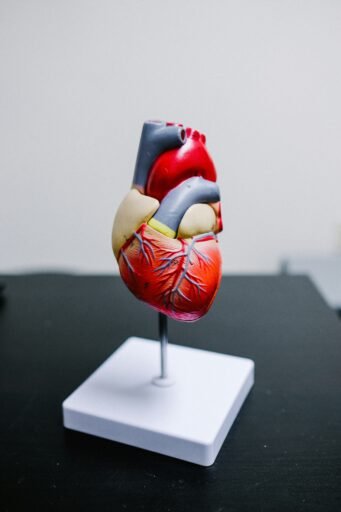Imagine that you’re sitting in a crowded room, surrounded by people, when suddenly you start to feel a gripping pain in your chest. It feels as if someone is squeezing your heart, making it difficult to breathe. Your mind races, and thoughts of impending doom flood your consciousness. You wonder if you’re having a heart attack or if something is seriously wrong with you. But, deep down, you know that this chest pain is not physical – it’s a manifestation of your anxiety. In this article, we will explore the intricate sensations and experiences associated with chest pain from anxiety, offering insights and understanding for those who have felt this all-too-common symptom firsthand.
Causes of chest pain from anxiety
Anxiety-induced chest pain
Chest pain caused by anxiety is a common manifestation of an underlying anxious state. When you experience anxiety, your body’s stress response system is activated, leading to various physical symptoms, including chest pain. The exact mechanism behind this is not fully understood, but it is believed that the release of stress hormones and the activation of the sympathetic nervous system contribute to the development of chest pain.
Muscle tension and chest pain
Anxiety often manifests as muscle tension, and this tension can extend to the muscles in your chest. When you are anxious, your body may unconsciously tighten these muscles, leading to discomfort and pain in the chest area. This pain can feel sharp, stabbing, or achy, and may even radiate to your back or shoulders.
Hyperventilation and chest pain
Hyperventilation, or rapid breathing, is a common symptom of anxiety. When you hyperventilate, you breathe in more oxygen than your body needs, and this can upset the balance of gases in your blood. This can cause a variety of symptoms, including chest pain. Hyperventilation-induced chest pain is often described as a tightness or pressure in the chest, making you feel as though you’re unable to take a full breath.
Symptoms of chest pain from anxiety
Sharp or stabbing pain
Chest pain caused by anxiety is often described as sharp or stabbing. It may come and go or persist for extended periods, and it can be quite distressing. This pain is typically unrelated to physical exertion or heart-related conditions, and it often disappears when the anxiety subsides.
Tightness or pressure in the chest
Another common symptom of anxiety-related chest pain is a sensation of tightness or pressure in the chest. You may feel as though a weight is pressing down on your chest, making it difficult to breathe deeply. This sensation can increase anxiety levels, leading to a vicious cycle of increased chest pain and heightened anxiety.
Pain that travels to the arms, shoulders, or jaw
Anxiety-induced chest pain can sometimes radiate to other areas of the body, including the arms, shoulders, or jaw. This can be a cause for further concern, as many individuals associate such pain with heart-related issues. However, in cases of anxiety, the pain is typically not severe and does not worsen with physical activity.
Shortness of breath or difficulty breathing
Chest pain from anxiety often goes hand in hand with shortness of breath or difficulty breathing. You may feel as though you can’t take a deep breath or that you’re not getting enough air. This can further exacerbate feelings of anxiety and panic, intensifying the chest pain.
Rapid heart rate or palpitations
Anxiety can cause your heart rate to increase, leading to a sensation of rapid heartbeats or palpitations. When this occurs alongside chest pain, it can be particularly distressing. It’s important to remember that anxiety-related palpitations are generally harmless and temporary.
Dizziness or lightheadedness
In some cases, anxiety-induced chest pain may be accompanied by feelings of dizziness or lightheadedness. This can be attributed to the body’s heightened stress response, which can cause blood vessels to constrict and lead to reduced blood flow to the brain. These symptoms can add to the overall discomfort and distress associated with chest pain from anxiety.
Sweating, nausea, or digestive issues
Chest pain related to anxiety may also present with other symptoms such as sweating, nausea, or digestive issues. This can include feelings of queasiness, an upset stomach, or even diarrhea. These symptoms are interconnected with the body’s stress response and can vary in intensity from person to person.
Feeling of impending doom or panic
One of the hallmark symptoms associated with chest pain from anxiety is a feeling of impending doom or panic. This overwhelming sense of fear or a looming catastrophe can intensify the chest pain and lead to heightened anxiety levels. It’s essential to recognize and address these psychological symptoms alongside the physical manifestations.

Differentiating anxiety-related chest pain from other conditions
Heart attack
It is crucial to differentiate anxiety-related chest pain from a heart attack, as the symptoms can be similar. While both conditions may present with chest pain and discomfort, there are key differences to consider. Anxiety-related chest pain is often sharp, stabbing, and transient, and it is not typically associated with physical exertion. Conversely, heart attack-related chest pain is often described as a crushing, squeezing sensation that may radiate down the left arm and is usually triggered by physical activity or stress.
Gastrointestinal issues
Certain gastrointestinal conditions, such as acid reflux or gastritis, can also cause chest pain. These conditions may be more common in individuals with anxiety, as stress can contribute to the development or exacerbation of digestive issues. However, unlike anxiety-related chest pain, gastrointestinal-related pain is often associated with meals, worsens with certain foods or positions, and may be accompanied by symptoms such as heartburn, bloating, or belching.
Musculoskeletal problems
Musculoskeletal problems, such as costochondritis or muscle strain, can mimic the symptoms of anxiety-related chest pain. These conditions involve inflammation or injury to the muscles, cartilage, or bones in the chest area. However, unlike anxiety-related chest pain, musculoskeletal pain tends to worsen with movement or palpation of the affected area and can be relieved with rest and over-the-counter pain medications.
Pulmonary conditions
In rare cases, chest pain related to anxiety may be indicative of an underlying pulmonary condition, such as a blood clot in the lungs (pulmonary embolism) or pneumonia. These conditions may present with chest pain, shortness of breath, and a cough. If you are experiencing these symptoms or have a preexisting respiratory condition, it is essential to seek medical attention to rule out any potentially serious underlying conditions.
When to seek medical attention for chest pain from anxiety
Seeking immediate medical attention
While anxiety-related chest pain is typically benign, there are instances where immediate medical attention is warranted. Seek emergency medical care if you experience severe chest pain that is long-lasting or worsening, accompanied by shortness of breath, pain radiating down the arm, jaw, or shoulder, dizziness, or loss of consciousness. These symptoms can be indicative of a more serious medical issue, such as a heart attack.
Consulting a healthcare professional
If you are unsure whether your chest pain is related to anxiety or another underlying condition, it is always recommended to consult with a healthcare professional. They can evaluate your symptoms, perform necessary tests or screenings, and provide an accurate diagnosis. Seeking medical advice can help alleviate any concerns and ensure appropriate treatment.
Addressing the underlying anxiety
Even if your chest pain is solely related to anxiety, it is important to address the underlying anxious state to prevent recurring episodes. Anxiety can significantly impact your quality of life, so seeking appropriate support and treatment is crucial. A healthcare professional can develop a personalized plan that may include therapy, stress management techniques, lifestyle changes, or medication options to address both the chest pain and the root cause of the anxiety.

Coping strategies and remedies for chest pain from anxiety
Deep breathing exercises
Deep breathing exercises can help alleviate anxiety-induced chest pain by promoting relaxation and regulating your breathing patterns. To practice deep breathing, find a quiet and comfortable space, close your eyes, and take slow, deep breaths in through your nose and out through your mouth. Focusing on your breath can divert your attention away from the pain and create a sense of calm.
Progressive muscle relaxation
Progressive muscle relaxation is a technique that involves tensing and then releasing different muscle groups to reduce muscle tension and promote relaxation. This can be particularly helpful for chest pain caused by muscle tension related to anxiety. Start by tensing the muscles in your chest for a few seconds, then release the tension while focusing on the sensation of relaxation. Repeat this process with other muscle groups, such as your shoulders, arms, or legs.
Journaling and expressing emotions
Writing in a journal or expressing your emotions through creative outlets can be an effective way to manage anxiety-induced chest pain. By putting your thoughts and feelings into words, you can gain insight into your emotions and identify triggers or stressors. This process can help you better understand and cope with your anxiety, ultimately reducing the frequency and intensity of chest pain.
Engaging in physical activity
Regular physical activity has been shown to reduce anxiety and relieve stress, making it an excellent coping strategy for anxiety-related chest pain. Engaging in activities such as walking, jogging, swimming, or yoga can help release endorphins, improve your mood, and promote overall well-being. It is essential to choose activities that you enjoy and can incorporate into your routine consistently.
Using calming techniques
Calming techniques, such as meditation, mindfulness, or guided imagery, can help quiet the mind and reduce anxiety-related chest pain. These practices involve focusing your attention on the present moment, letting go of intrusive thoughts, and cultivating a sense of calm and relaxation. Apps or online resources can provide guided sessions to assist you in developing these skills.
Seeking therapy or counseling
Therapy or counseling can be instrumental in managing anxiety-related chest pain. Working with a trained mental health professional can help you gain a deeper understanding of your anxiety, identify triggers, and develop effective coping strategies. They can provide guidance and support tailored to your specific needs, empowering you to take control of your anxiety and reduce chest pain episodes.
Exploring medication options
In some cases, medication may be prescribed to manage anxiety-related chest pain. Anti-anxiety medications or selective serotonin reuptake inhibitors (SSRIs) may be recommended to help alleviate anxiety symptoms and reduce the frequency and intensity of chest pain. It is essential to consult with a healthcare professional to weigh the benefits and potential side effects of medication based on your unique circumstances.
Preventing chest pain from anxiety
Identifying triggers and stressors
Identifying triggers and stressors that contribute to your anxiety can be key in preventing chest pain episodes. Take note of situations, environments, or thought patterns that tend to escalate your anxiety levels. Once identified, you can develop strategies to avoid or manage these triggers, reducing the likelihood of experiencing chest pain.
Practicing stress management techniques
Incorporating stress management techniques into your daily routine can help prevent anxiety-related chest pain. Techniques such as deep breathing exercises, progressive muscle relaxation, meditation, or engaging in hobbies can help reduce stress and promote relaxation. Experiment with different techniques to find what works best for you.
Maintaining a healthy lifestyle
Adopting and maintaining a healthy lifestyle can have a significant impact on both your physical and mental well-being, reducing the frequency and severity of anxiety-related chest pain. This includes eating a balanced diet, getting enough sleep, and avoiding excessive consumption of caffeine or alcohol. Prioritizing self-care and engaging in activities that bring you joy and relaxation can also help reduce anxiety levels.
Engaging in regular physical activity
Regular physical activity not only helps alleviate anxiety but also contributes to overall cardiovascular health. Engage in activities that you enjoy and can sustain over time, aiming for at least 150 minutes of moderate-intensity aerobic exercise per week. Physical activity releases endorphins, improves sleep quality, and reduces stress, ultimately minimizing the occurrence of chest pain.
Establishing a support network
It can be beneficial to establish a support network of family, friends, or support groups who can provide emotional support and understanding. Sharing your experiences with others who have gone through similar struggles can help alleviate feelings of isolation and provide valuable insights and coping strategies. Having a strong support system can contribute to your overall well-being and aid in managing anxiety-related chest pain.
In conclusion, chest pain from anxiety is a common and distressing symptom that many individuals experience. Understanding the causes, symptoms, and differentiation from other conditions can help you identify and manage anxiety-related chest pain effectively. Remember to seek medical attention if you are unsure about the cause of your chest pain or if you experience severe symptoms. With proper support, coping strategies, and a focus on addressing underlying anxiety, you can reduce the frequency and intensity of chest pain and improve your overall quality of life.
